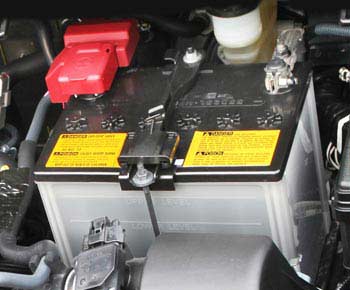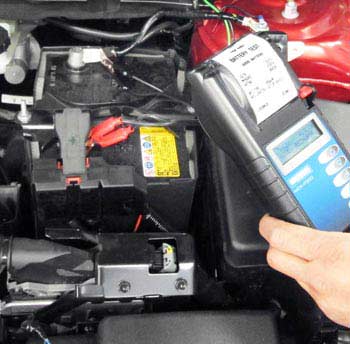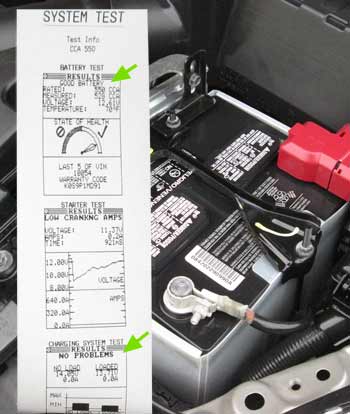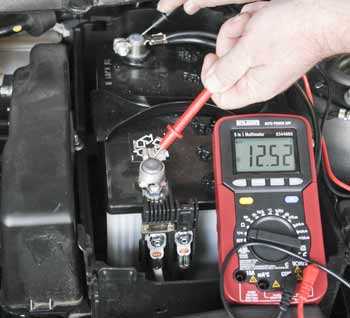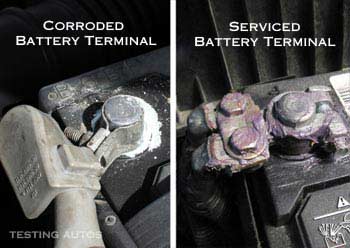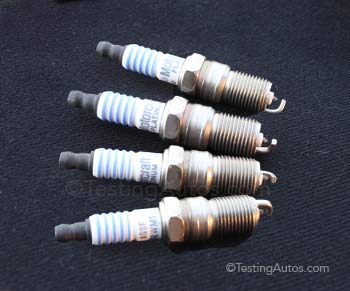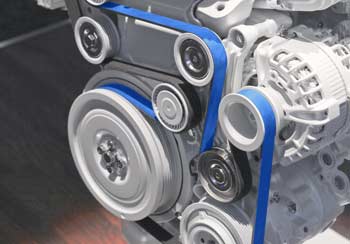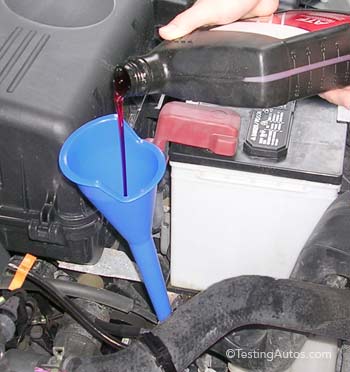When to replace the 12-Volt car battery?
Updated: July 16, 2022
The 12-volt battery in your vehicle needs to be replaced when its capacity drops close to or below the safe level. The capacity of the battery is the ability to hold charge. If you suspect that your battery is getting weak, have it tested at your next service. Your repair shop can test the actual capacity or Cold Cranking Amps (CCA) of your battery and compare it to its CCA rating. If the battery fails the test, have it replaced. In most cars the battery is replaced after 5-7 years. How it works: the 12-volt battery in your car stores the electric power to start your engine. When the engine is running, the alternator generates electric power and recharges the battery.
A new battery has full capacity or the ability to hold charge. It can store enough charge to power the electrical system when the car is parked for days and turn over your engine multiple times to start it. Over time, however, the battery loses its capacity. Motorists often find this on one of the cold mornings when the vehicle doesn't start and needs to be boosted. For this reason, the best time to have the battery tested is before the cold season.
How long do car batteries last?
Medium-size 12-volt car batteries, like the one in the photo, last on average for 7 years. Smaller batteries, like in some Honda vehicles, last for about 5 years. Larger batteries in many trucks last for 8-10 years. In our experience, a battery lasts longer if the vehicle is driven daily and the battery is kept fully charged. The life of the battery also depends on the outside temperature: if the climate is too hot or too cold, the battery's life will be shorter. Also, if the vehicle is parked for extended periods of time, the battery can fail prematurely. The quality of the battery matters too. We have seen cheap batteries failing after 3-4 years.What are the signs of a bad car battery?
- When the battery's capacity becomes low, you might notice that the engine turns over slower, not as eagerly as before when starting the car in the morning.
- The dash lights may dim when starting the vehicle.
- When you operate your power windows after the engine is turned off, the windows move much slower than when the engine is running.
- If your old battery needs to be boosted after the car has been parked for a few days, it's also a sign that it has low capacity and needs to be tested or replaced soon.
- The lights become darker when the engine is idling, but become brighter when the engine is revved.
- If the car has an electric power steering, a lack of power steering assist when the engine is just started can also be caused by a weak battery.
- Excessive corrosion at the battery terminals and cables (see the photo) also suggests that the battery is getting weaker.
How can the battery capacity be tested?
The battery capacity is measured in CCA or Cold Cranking Amps. A new average-size battery like the one in the top photo is rated between 520 and 650 CCA.Many automotive repair shops can test your battery with a battery tester (in the photo). The battery tester can measure the actual CCA and compare it to the new battery CCA rating. The battery CCA rating is marked on the battery itself, see the photo.
The battery tester can also test the alternator and the charging system. Read more about the charging system: When does the alternator need to be replaced?
The battery and charging system test, also known as the AVR test, costs from $20 to $50. Some auto parts stores such as Autozone or O'Reilly Auto Parts offer a battery test at no charge. Many car dealers and repair shops often offer a free battery test as a part of a larger service or a seasonal promotion.
After the test, you might get a printout showing the battery CCA rating and the measured CCA. The printout will indicate if the battery should be replaced or if it's in good condition. It may show that the battery needs to be recharged first and then re-tested. See the sample printout in the photo.
Can you test a battery with a voltmeter?
The battery voltage is an indicator of the state of charge of the battery. A fully charged battery should read 12.6 volts or more with the engine off. If the battery shows less than 12 volts, it's completely discharged. However, even an old failing battery with low capacity will show 12.6 volts when fully charged.To test the capacity of the battery, the battery voltage needs to be tested under load. The longer the battery can hold the voltage under load, the larger its capacity.
For example, if the fully-charged battery voltage with the engine OFF and headlights ON drops from 12.6 volts to less than 11.5 volts in a couple of minutes, the battery's capacity is low. If the battery voltage with the engine OFF and headlights ON stays close to 12 volts even after 10 minutes, the battery is good.
Does the 12 Volt car battery need any maintenance?
Most modern cars have maintenance-free batteries. When you take your car for an oil change, your mechanic will inspect the battery visually. If the battery terminals show corrosion as in the photo, your mechanic may recommend servicing the battery terminals.The battery terminal service costs from $25 to $60. It includes cleaning the battery posts and terminals and applying a protective spray or grease.
How much does the battery replacement cost?
A new car battery costs from $140 to $550 and your dealer may charge another $50-$65 to have it replaced. Replacing a car battery as a do-it-yourself project is not very difficult, but the battery is heavy (30-45 lb). Lifting it out of the car can be hard on your back. An old battery is often covered in electrolyte, which is very acidic and can burn your clothes or skin. Here is a video from O'Reilly Auto Parts.Our recommendation is to leave it to the pros. Some cars require a specific battery type. To make sure, check the vehicle owner's manual or consult with your local dealer.
Where to recycle an old car battery? Some automotive repair shops and car dealers will accept your old battery for recycling. For example, you can find the nearest place to recycle your old battery at the Interstate Batteries website.
How long is the battery warranty? In most cars, the battery is covered under the basic bumper-to-bumper warranty. In some cars, the battery coverage is pro-rated. This means, for example, the labor might be fully covered, while the part might be covered 100 percent within the first year, 50 percent within the second year and so on. You can find the warranty coverage details in your Warranty Guide brochure or on the manufacturer's website.
How to boost your car when the battery is low on charge? To boost you car, you will need a portable booster or jumper cables to boost from another car. Your owner's manual has the proper instructions. Be careful, if the booster cables are connected to wrong terminals, it may cause a big spark and some fuses could be fried.
How long does it take to recharge a good battery that is low on charge? If the battery is still good, 20-40 minutes of running the engine or driving is usually enough to recharge it. However, be aware that in some cars with electric power steering, the steering assist might not work properly until the battery is sufficiently charged. This can make driving with a low battery dangerous.
If a good battery has not been used for an extended period of time and is completely drained, it might need longer time to recharge.
How does the car battery work? The car battery works by storing the chemical energy that can be converted into electric energy. While charging, the opposite conversion happens.
Most cars have lead-acid batteries that are made of six cells. Each cell has lead plates connected to the negative terminal of the cell and lead-oxide plates connected to the positive terminal of the cell. Each cell produces 2 volts. Six cells are connected in series to produce 12 volts. Cells are filled with an electrolyte (diluted sulfuric acid).
